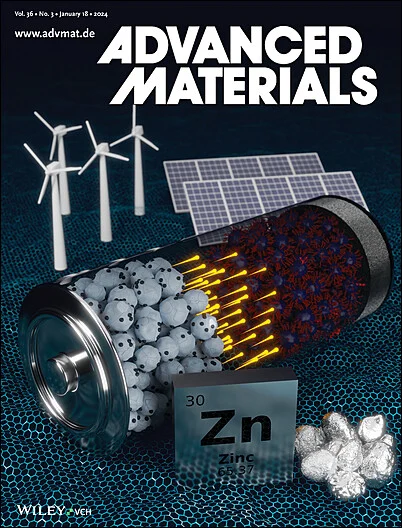Molecular Engineering of Polymer Brushes Enables Lithium-Sulfur Battery Stable Operation under Ultra-Wide Temperature Range.
IF 27.4
1区 材料科学
Q1 CHEMISTRY, MULTIDISCIPLINARY
引用次数: 0
Abstract
Achieving stable operation under a wide temperature range is a critical target for the practical applications of lithium-sulfur batteries. However, intense lithium polysulfides (LiPSs) shuttling at high-temperature, sluggish sulfur species conversion, and inhomogeneous Li+ deposition at low-temperature severely impair the cycle lifespan of batteries. Herein, the multifunctional polymer brushes are fabricated by grafting anthraquinone-functionalized poly(glycidyl methacrylate) brushes on graphene surfaces (G-pGMAAQ) to simultaneously regulate the evolution of sulfur and lithium species. Combining theoretical calculations and experiments, it is revealed that G-pGMAAQ serves as a redox mediator that reduces the LiPSs conversion energy barrier, and its unique polar brush-like structure effectively inhibits LiPSs shuttling and homogenizes Li+ flow. Hence, G-pGMAAQ facilitates lithium-sulfur batteries stable operation in an ultra-wide temperature range (-40-70 °C). Furthermore, the Ah-level pouch cell achieves an energy density of 417 Wh kg-1, demonstrating the commercial potential of polymer brushes for lithium-sulfur batteries.聚合物电刷的分子工程使锂硫电池在超宽温度范围下稳定工作。
实现宽温度范围下的稳定运行是锂硫电池实际应用的关键目标。然而,锂多硫化物(LiPSs)在高温下的剧烈穿梭、硫种转化缓慢以及低温下Li+的不均匀沉积严重影响了电池的循环寿命。本文通过在石墨烯表面(G-pGMAAQ)上接枝蒽醌功能化聚甲基丙烯酸缩水甘油酯(缩水甘油酯)刷,制备了多功能聚合物刷,以同时调节硫和锂的演化。理论计算和实验结果表明,G-pGMAAQ作为氧化还原介质,降低了LiPSs的转化能垒,其独特的极性刷状结构有效抑制了LiPSs的穿梭,使Li+流动均匀化。因此,G-pGMAAQ有助于锂硫电池在超宽温度范围(-40-70°C)下稳定运行。此外,ah级袋状电池的能量密度达到417 Wh kg-1,证明了聚合物电刷用于锂硫电池的商业潜力。
本文章由计算机程序翻译,如有差异,请以英文原文为准。
求助全文
约1分钟内获得全文
求助全文
来源期刊

Advanced Materials
工程技术-材料科学:综合
CiteScore
43.00
自引率
4.10%
发文量
2182
审稿时长
2 months
期刊介绍:
Advanced Materials, one of the world's most prestigious journals and the foundation of the Advanced portfolio, is the home of choice for best-in-class materials science for more than 30 years. Following this fast-growing and interdisciplinary field, we are considering and publishing the most important discoveries on any and all materials from materials scientists, chemists, physicists, engineers as well as health and life scientists and bringing you the latest results and trends in modern materials-related research every week.
 求助内容:
求助内容: 应助结果提醒方式:
应助结果提醒方式:


